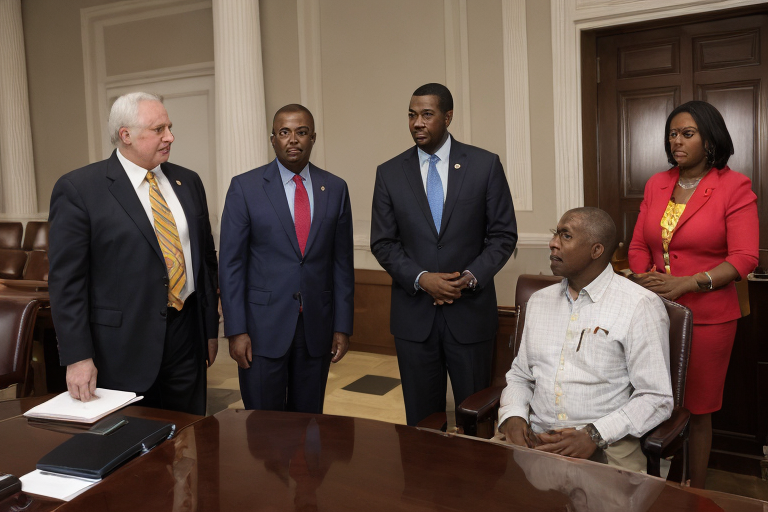The article discusses the Democratic primary in Maryland for the open Senate seat, with Angela Alsobrooks and David Trone vying for the position. Here’s a summary of the main points:
– Alsobrooks, the executive of Prince George’s County, could become the third Black woman ever elected to the Senate. She is supported by the majority of the Maryland delegation, as well as key members of House Democratic leadership. However, Trone, the co-owner of Total Wine & More, has also received support from prominent Black women from Alsobrooks’ district.
– The primary is not simply about coalition politics versus money, as Trone has also attracted support due to his record on issues such as hiring formerly incarcerated people and receiving backing from the teachers union.
– Both candidates have similar policy positions on major federal issues, with Alsobrooks focusing on her lived experience as a point of contrast with Trone, particularly in relation to protecting abortion rights. Trone, meanwhile, has pointed to the stakes of November and making an electability argument about having the resources to defeat former Republican Governor Larry Hogan, whose popularity in the state could jeopardize Democrats’ chances of holding the seat – and with it, the Senate majority.
– The potential history-making aspect of Alsobrooks’ candidacy is not her central pitch to voters, although many of her female supporters stressed that this isn’t about identity politics either. Some Black women here see Trone as better equipped due to his voting record and argue that experience – and whose is more relevant – has become a flashpoint that’s also brought the conversation back to race.
– Experience – and whose is more relevant – has become a flashpoint that’s also brought the conversation back to race. Trone has leant into his voting record and argued that he’ll be able to get 10 Republicans to sign on to legislation in the Senate to overcome a filibuster. However, his campaign has faced criticism over an attack ad that a local lawmaker described as “tones of misogyny and racism.”
– Black women leaders have written a letter saying Trone’s ads echo “tones of misogyny and racism.” They argue that this attempt to undermine Alsobrooks’ candidacy is deeply troubling and emblematic of the obstacles Black women face in political spheres. Alsobrooks has called out Trone’s comments, stating that this kind of disparaging remark is what Americans have seen too much of in Washington and that it shows what is in his mind – that he has a very low opinion of women.
– While Trone has a big lead in fundraising, it hasn’t necessarily put the race away for him, according to Mileah Kromer, who oversees the Goucher College Poll. For some voters, Trone’s ability to fund is itself a turn-off.
– Both candidates have highlighted their records and policies, with Alsobrooks focusing on her lived experience as a point of contrast with Trone, particularly in relation to protecting abortion rights. Trone, meanwhile, has pointed to the stakes of November and making an electability argument about having the resources to defeat Hogan. The eventual nominee will likely face Hogan, whose popularity in the state could jeopardize Democrats’ chances of holding the seat – and with it, the Senate majority.
– The article quotes various voters, including some who stated that they were leaning towards Trone due to his hiring of formerly incarcerated people and his backing from the teachers union, among other reasons, while others preferred Alsobrooks based on their personal experiences and perceptions of the candidates’ abilities.
– The article also mentions Ellie Malcolm, the founder of EMILY’s List, which recently made a $2.5 million investment in the race.
– The article notes that Maryland is a state where Kromer estimates that the Democratic primary electorate is about 40 to 45% Black.
– The article concludes by stating that the potential history-making aspect of Alsobrooks’ candidacy isn’t her central pitch to voters, and many of her female supporters stressed that this isn’t about identity politics either. However, experience – and whose is more relevant – has become a flashpoint that’s also brought the conversation back to race. Ultimately, it appears that the primary will be decided by factors such as these experiences, policy positions, the candidates’ abilities, and the voters’ preferences.



Leave a Reply